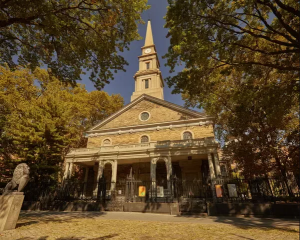
The Poetry Project at St. Mark’s Church, Photo Credit: Courtesy of Poets & Writers
While most students really connect to at least one or two texts in the syllabus, many students experience Contemporary Civilization as a painful slog through the dregs of Western philosophy, a subject widely felt to be as stale as it is arcane and as somber as it is nutty. The prospect of reading long, difficult, debatably anachronistic and most often bigoted texts doesn’t appeal to everyone. More than that, I think that few students are in practice swayed by the old argument(cf. Picasso on art, Alexander McQueen on fashion, the fourteenth Dalai Lama on life) that you have to know the rules to break them, as it applies to the Core. If there is some analogue for “the rules” in an age of American cultural hegemony, the Core supposes that it’s the Western canon. However warily, let’s accept this premise against Audre Lorde’s best advice re: “the master’s tools” (a subject for another blog post). How can it ever feel like a drag to have to read Augustine (as it did for me), or Marx, or Ambedkar when these texts are meant to pull you out of whatever proverbial Truman Show you’ve been living in and into real, bona fide reality, where you can change things, for real?
My guess is that however deeply you believe in the Core, it can be a little disappointing to find that you will be learning about philosophy and art and science via old books and presentations, mostly, with the odd trip to the Met Opera. Books, especially philosophy books, are rigorous, which is good, but they can be dense and gnomic and difficult to discuss. Critically, because reading and studying in a classroom doesn’t have to be much more than just that, a Core student can easily pass many hours demonstrating her understanding of the texts without directly seeing their relevance to the nature of the institutions she engages with, the art and media she consumes, or the city she lives in. This sort of engagement with the Core most often takes place outside of the classroom. Usually, it involves getting out of Morningside Heights and going places, bumping into things, taking weird paths. You don’t earn credits for it and it takes a lot of time, so it isn’t often done, at least not with Augustine in mind.
You might go to a poetry reading, for example. A couple of months ago, I attended a reading at St. Mark’s Church hosted by The Poetry Project. Fred Moten, one of my favorite writers and a professor at NYU, and Ronaldo V. Wilson, each read excerpts from their recently published books. (Wilson didn’t read so much as sing, actually. He began his portion of the reading by dancing from his chair to the microphone.)
The discussion that followed the reading was casual but dense; they spoke of the loneliness of writing, the nature and importance of Black aesthetics, and their long careers as distinguished writers and teachers. They asked what it means to be “up in there,” and joked that while philosophers are interested in propositional statements, they tend to be interested in prepositional statements. They talked at length about the importance of community to doing scholarship, referencing cenobitic, as opposed to anchoritic, monasticism, and mused that, as kids and maybe even today, they “just want to be in a band with other people who want to be in a band.” Even with all of Moten and Wilson’s humor and humility, I would have been almost completely lost if I had never learned of the evolution of propositional logic from Chrysippus to Frege, or seen that Caravaggio painting of Saint Jerome translating the Vulgate, or discussed postcolonial studies
after reading Fanon.
This reading was pretty academic (I knew what I was getting into with Moten) but some things happened there that do not usually happen in Core seminars: I met totally random people, and some heroes of mine, for free, in a room I had never been in, where ideas were being exchanged, and there was no lesson plan, and absolutely everyone was welcome. Ideas move differently outside of the classroom; you learn things out of order, and connect ideas that had seemed totally disparate, and you wonder about where you are, about the history of the place and about the strength and passion of the people who must be needed to keep it standing. For those interested in radically different ideas—those who want to break the rules, like Moten and Wilson—and equally for everyone else, sticking your nose in all those dusty tomes is an absolute necessity; but don’t let your interaction with the Core end there. Make things more interesting for yourself. Bring the Core with you somewhere.
